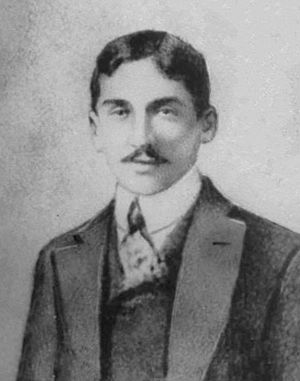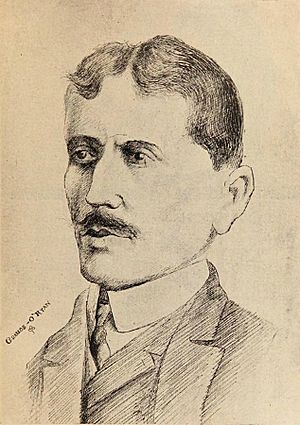Carlos Pezoa Véliz facts for kids
Quick facts for kids
Carlos Pezoa Véliz
|
|
|---|---|

Carlos Pezoa Véliz in 1905
|
|
| Born | July 21, 1879 Santiago, Chile |
| Died | April 21, 1908 (Aged 29) Santiago, Chile |
| Occupation | Poet, Journalist |
| Literary movement | Modernismo, Postmodern literature |
| Notable works | Alma chilena, Las campanas de oro, Cuentos y Artículos |
Carlos Pezoa Véliz (born July 21, 1879 – died April 21, 1908) was a talented poet, educator, and journalist from Chile. Much of his writing was not published until after he passed away at the age of 28. He later became known as a very important person in the history of Chilean poetry.
Contents
About Carlos Pezoa Véliz
Early Life and Family
Carlos Pezoa Véliz was born in Santiago, Chile, on July 21, 1879. He was adopted as a baby by José María Pezoa and Emerecia Véliz. This elderly couple had no children of their own.
His Journey as a Writer
Pezoa Véliz wrote poetry that was part of the post-modernist movement in Latin America. This style was different from older forms of poetry. His poems used language in new ways. They helped people see the world differently. They also explored the culture and feelings of the Chilean people.
Many people see Pezoa Véliz as a key founder of Chilean poetry. Chile has produced famous poets like Pablo Neruda and Gabriela Mistral.
During his life, his poems and stories appeared in magazines and newspapers. After he died, his friend Ernesto Montenegro collected his works. In 1911, this collection was published as Alma Chilena (The Chilean Soul). This book was named after one of Pezoa Véliz's most famous poems.
Later, in 1927, Armando Donoso published a new book. It included more poems, short stories, and articles. This book was called Campanas de Oro (The Golden Chimes). More of his works were added to an anthology by Nicomedes Guzman in 1957.
What Did He Write About?
Pezoa Véliz wrote about the everyday lives of Chilean people. His poems often focused on rural and city life. He wrote about poor farmers, outcasts, and those who were struggling.
He used everyday language and humor in his writing. Sometimes, his poems also showed sadness and despair. His work was often rebellious and critical. It used irony and parody. Yet, it also had a simple and deep beauty. Some experts say his style was an early version of what Nicanor Parra would later do.
Teaching and Journalism
In the late 1800s, Carlos Pezoa Véliz began publishing poems. He also wrote articles for a newspaper called El búcaro santiaguino. At this time, he was teaching at the San Fidel School. He was later fired from this job due to his lifestyle.
He was inspired by writers like Manuel Gutierrez Nájera and Edgar Allan Poe. He also liked Rubén Darío and the "oddities" of modernism. His work also showed a social side. This might have come from reading authors like Maxim Gorki and Leo Tolstoy.
In the early 1900s, he started working as a journalist. He wrote for newspapers like El Chileno and La Voz del Pueblo. Being a journalist allowed him to learn about the nitrate mines in northern Chile. He wrote about this in his short story, El taita de la oficina (The office daddy).
His published works made him well-known in literary groups. He became an important member of the Ateneo de Santiago. He was also made the Municipal Secretary of Viña del Mar. This city, along with Valparaíso, was very important in his life. He kept publishing poems and stories in magazines. Some of his most loved poems include El perro vagabundo (The vagabond dog) and El organillo (The Hand Organ).
Main Books and Publications
- Alma Chilena (1911)
- Las campanas de oro (1920)
- Cuentos y Artículos (1927)
- La lira chilena
- Pluma y lapis
- Luz y sombra
- El perro vagabundo
- Nada
- El pintor pereza
- El organillo
- El taita de la oficina
- Antología de Carlos Pezoa Véliz (1957)
- Carlos Pezoa Véliz, Poesias liricas
See also
 In Spanish: Carlos Pezoa Véliz para niños
In Spanish: Carlos Pezoa Véliz para niños
 | James Van Der Zee |
 | Alma Thomas |
 | Ellis Wilson |
 | Margaret Taylor-Burroughs |


